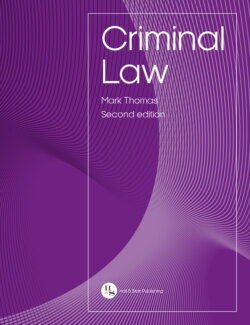Читать книгу Criminal Law - Mark Thomas - Страница 17
На сайте Литреса книга снята с продажи.
1.5.1 Principle of ‘fair warning’
ОглавлениеThis principle reflects the idea that the law should be communicated in a clear and accessible manner to the public. Given that England and Wales has a common law legal system, it has long been advocated that, in order to give true effect to this principle, the criminal law should be codified, as in civil law systems. Robinson (‘A Functional Analysis of Criminal Law’ (1994) 88 Nw UL Rev 857) is of the view that multiple codes are required in order to promote this principle. Robinson advocates the use of a code written in simple language explaining to the public what they can and cannot do (a ‘rule articulation’ code) and codes that are used for the administration and enforcement of law (a ‘liability assessment’ code).
The principle of fair warning is essential to understanding how an offence should be defined. References to undefined or ambiguous terms in a statute, for example, would be contrary to the principle of fair warning. By way of example, the term ‘dishonesty’ used in the Theft Act 1968 has not been afforded a statutory definition, despite its dominating presence in the law. The common law has had to step in to provide such a definition, but it is necessary, for the promotion of this principle, that the definition is clear, accessible and informs the general public of what they cannot do (ie what is dishonest and, as such, what they cannot do which is dishonest).
